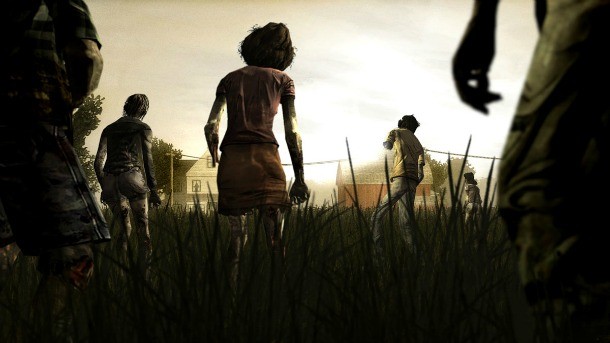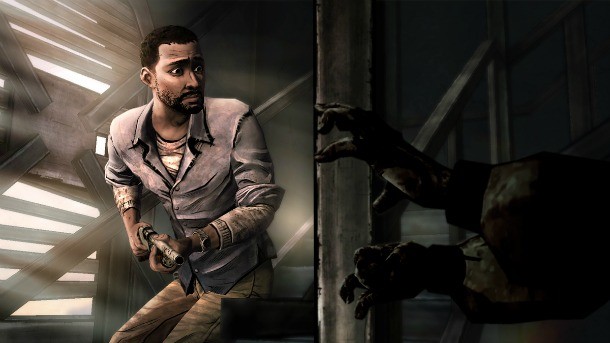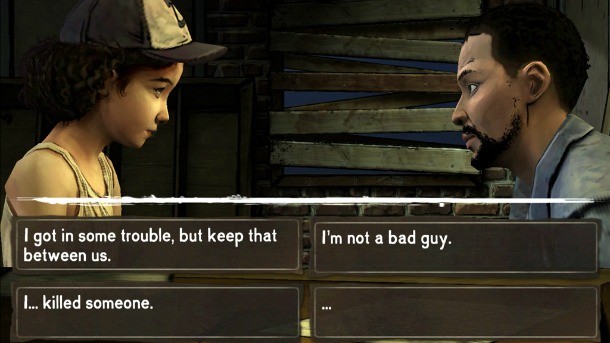Please support Game Informer. Print magazine subscriptions are less than $2 per issue
The Walking Dead Makes The Case For Episodic Gaming

The Walking Dead isn’t Telltale Games’ first foray into episodic gaming; The Sam & Max, Jurassic Park, and Back to the Future series were all attempts to strike gold with the formula. With over 4 million episodes already sold, however, The Walking Dead is definitely the most successful. From the start, they have made their intentions with the game clear: create a season with manageable, bite-size chunks that you can tackle at your leisure. Craft meaningful choices that carry over from one episode to the next, making an overarching experience that unifies the individual parts.
Developing an episodic game has its challenges, though. With every new episode, Telltale needs to keep players engaged with the story enough to be willing to buy the next. Emotionally charged decisions need enough weight to affect you properly, but not so much that you’re burnt out between chapters. While it’s difficult to create each contained episode in itself, the larger challenge comes from tying them all together.
Despite the obstacles, The Walking Dead has proven to be contagious. As the excitement mounts for the impending release of Episode 4: Around Every Corner, the allure of this episodic success is becoming all the more apparent. 
Time Management
For anyone who invests a lot of time in video games, the minimal time required for each episode is a huge attraction. During the holiday season especially, it’s hard to fit time in between the triple-A games. A season releasing over a period of months is perfect for playing between big name titles and succeeds in extending the experience past the couple of hours needed for an episode. In one sitting you can experience several life or death situations, form a deeper bond with the characters, and make decisions that carry over to the next chapter. Although the anticipation may sound agonizing, the wait between episodes leaves enough time to cope with your choices. Playing other games during this period also keeps the episodic series fresh. By the time the next episode rolls around, you’ll be eager to jump back in.

Player choice
Titles like Mass Effect and Heavy Rain allow you to shape the story within. Every choice carries weight and every action, a consequence. Player feedback immerses you in the narrative and creates a sense of ownership over the events that unfold. As this generation of consoles ends, player choice is being placed in the spotlight. With The Walking Dead, the branching tree of possible outcomes grows with every episode, ensuring that you remember or even regret every decision you make. The contrast between the games of two people can vary extremely based on the path they choose. If you feel like you’ve made the wrong decisions throughout your journey, you’re not the only one. In a game where every decision feels like the wrong one, living with your actions becomes the main draw. 
Character Investment
Making life altering decisions doesn’t have the same impact if you’re not attached to the characters being affected. From the moment you meet young Clementine, a bond between you and the survivors pervades every choice you make. On the surface, logical thinking seems like the best approach. “Her skill with a gun far outweighs his carefree attitude, right? Losing her would be a huge detriment to the group, whereas he won’t help us when things go south.” On the other side of the coin, though, emotion trumps reason. “His personality is far more comforting, while she’s abrasive and keeps to herself. I think I’ll save him.” This inner dialogue between the logical and emotional reasons guiding your choices rages throughout every episode. More than halfway through the season, there still hasn’t been an easy resolution to any conflict. This anxiety carries over to the gaps between episodes, too. We keep coming back for more, though.

Property Potential
A zombie apocalypse seems tailor made for the episodic formula. It’s a setting that, although not realistic, allows choices that carry their weight from episode to episode. The death of a friend, a poor tactical decision, or a Freudian Slip in a seemingly trivial conversation all work well to advance the plot. While the zombie apocalypse has been the most engaging episodic setting so far, aren’t there more properties that could use an episodic structure? Comic book fans were treated to an original character in video games with Cole McGrath from inFamous. What’s stopping developers from creating a new superhero with episodic installments, much like comic books already do? Every new episode could detail a new escapade in the hero’s journey, with offshoots and alternate timelines to boot. Perhaps new audiences could be reached with the episodic formula. Dramas, mystery series, soap operas; the list is endless. With the success that Telltale has found, maybe more developers will emerge with new properties to take advantage of the episodic formula.










